How Much to Feed an 80 Lb Dog
French author Francois de la Rochefoucauld said that "to eat is a necessity, but to eat intelligently is an art."
Feeding a cat looks simple enough at first glance. You buy a bag of food with a picture of a cat on it, dump it in a bowl, and wait for your cat to eat when he's hungry. It's an approach that can work, but it doesn't always bring out the best in your kitten or cat.
Feeding your cat well—really well—involves a little more thought.
In this cat feeding guide, you'll learn how to nourish your cat from kittenhood through his senior years. You'll find out how much to feed your cat at different life stages, how many meals he'll need per day, and which types of food are best.
We've broken down your cat's dietary needs by age group, giving you a roadmap for good nutrition at every stage of life.
Your Cat's Dietary Needs Evolve Over Time.
As your cat moves through kittenhood, early adulthood, and beyond, his nutritional needs will change. Meeting those requirements at every phase of life sets the stage for good health.
Your first stop when choosing the right food for your cat? The nutritional adequacy statement.
Usually located on the back of the bag or can, this statement indicates whether or not the food is nutritionally complete and balanced for its intended life stage. The label will read, for example, "…formulated to meet the nutritional levels established by the AAFCO cat food nutrient profiles for all life stages".
Foods that aren't nutritionally complete and balanced will usually be labeled "for supplemental feeding only". These foods don't contain the appropriate balance of macronutrients (protein, fat, and carbohydrates) and micronutrients (vitamins and minerals) and shouldn't be your cat's sole source of nutrition.
While you're looking at the label, check out the feeding instructions as well. For the average house cat, the appropriate feeding instructions are usually already placed on the packaging of the cat food.
The nutritional guidelines on the package will point you in the right direction, though you may need to make some modifications to fit your cat's exact needs.
Here's A Guide On How To Feed Your Cat During The Different Phases Of His Life
Newborn Kitten, Age: 0-4 weeks
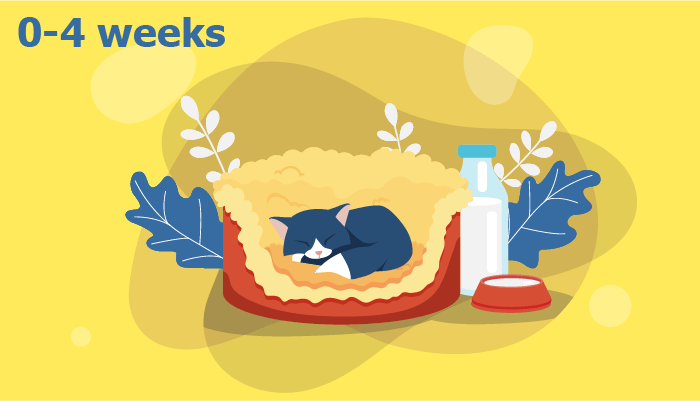
During this stage, most kittens rely on their mother's milk as their only source of nutrition. If their mother is present, you won't need to feed kittens at all—they'll know how to feed themselves! That said, if you've rescued an orphaned kitten, you'll need to bottle feed him. Kittens require a kitten milk replacer, which replicates the nutrition found in mother cat's milk. Do not feed a kitten cow's milk—it doesn't have the right nutritional balance to nourish a newborn kitten.
How Much Should You Feed Your Newborn Kitten?
If your kitten's mother is available to nurse, he will nurse freely. If you're bottle-feeding, follow the instructions on your package of kitten milk replacer. In most cases, you'll feed about 2 tablespoons of liquid kitten formula per 4 ounces of body weight.
How Often Should You Feed Your Newborn Kitten?
Newborn kittens feed frequently, latching on to nurse once every 1-2 hours. Mimic this feeding schedule when bottle feeding, gradually reducing the feeding frequency to 4-6 feedings per day by the time your kitten reaches three weeks of age.
Also Read: Best Wet Food For Kittens
4-8 Weeks Old Kitten
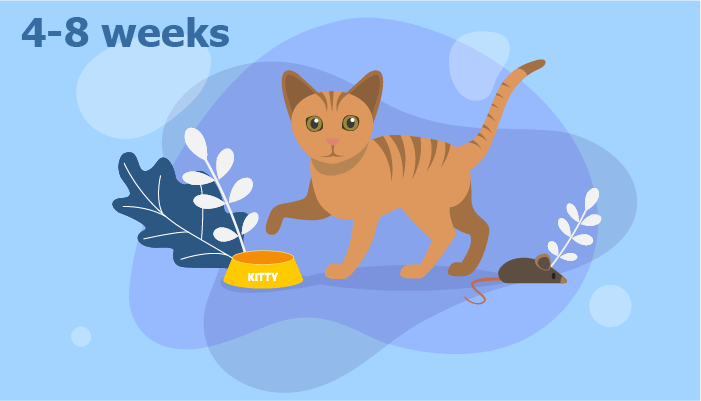
Kittens usually begin the weaning process around their 4th week. During this time, they'll start gradually shifting from milk or formula onto a solid food diet, which delivers the protein, fatty acids, and nutrients that fuel their early development.
At 4 to 4.5 weeks of age, bottle feeders may start slowly transitioning their kitten to a diet of watered-down kitten food. Start by replacing some of his usual meals with a loose slurry of wet kitten food and kitten formula in a bottle, then gradually starting feeding your kitten from a bowl.
Kitten Lady has an excellent video on transitioning your kitten from kitten formula to solid food.
How Much Should You Feed Your 4-8-week-old Kitten?
At this stage, your kitten is growing rapidly and needs about 3 times as many calories per pound as an adult. Your kitten may need 60 calories per pound of bodyweight.
How Often Should You Feed Your 4-8-week-old Kitten?
While your newborn kitten ate every 1 to 4 hours, kittens over 4 weeks may go 6 to 8 hours between meals. Frequent meals are still essential to accommodate your kitten's small stomach and high energy demands.
8-16 Weeks Old Kitten
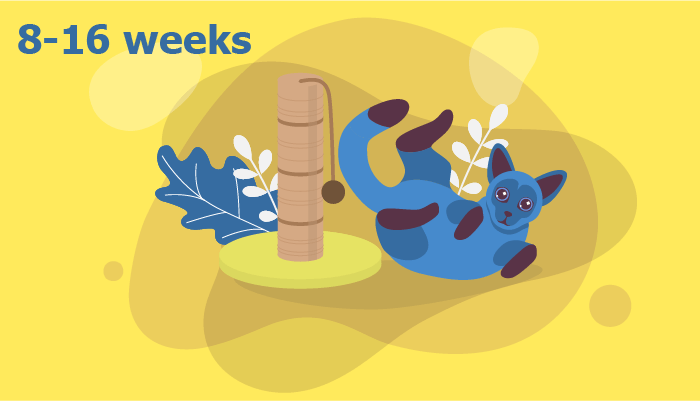
At this exciting stage of development, your kitten's personality is developing and his predatory nature is becoming ever more apparent. By 8-10 weeks of age, he's fully weaned and should be eating a meat-based kitten food that delivers plenty of protein, animal-derived fatty acids for brain and eye development, and the right levels of vitamins and minerals.
How Much Should You Feed Your 8-16-week-old Kitten?
During this phase, your kitten is developing rapidly and requires plenty of calories to support that growth. Growing kittens may need 250-280 calories per day, with larger breeds like Maine Coons and Ragdolls requiring as many as 360 calories daily.
How Often Should You Feed Your 8-16-Week-Old Kitten?
Five meals per day are ideal, but kittens over 8 weeks may also free feed on dry food. Be careful with free-feeding. While your kitten should be gaining weight at this stage, too much dry food can lead to excess weight gain.
Also Read: Best Kitten Food – Top 5 Best Kitten Foods On The Market Today
4-6 Months Old Kitten
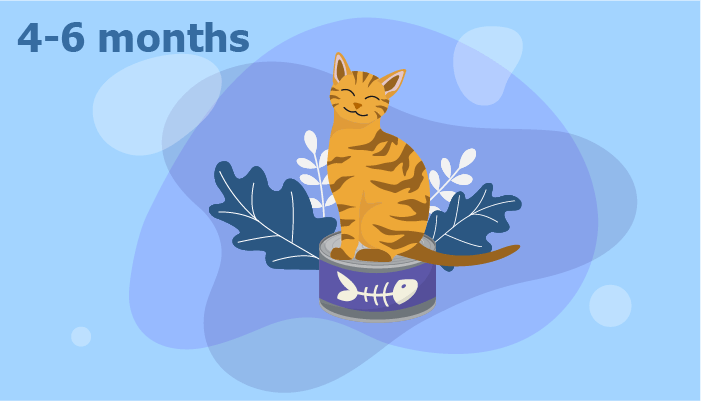
During this stage, your kitten will start to settle into his dietary routine. That's why it's vital to make sure you're establishing good habits for adulthood. Feeding a varied diet can keep your kitten from becoming finicky and keep him mentally stimulated. Note, also, that kittens who eat a dry diet at this stage will likely get hooked on the crunch and may not want to eat wet food later in life.
Wet or canned food is usually rich in species-appropriate animal-based protein, is lower in carbohydrates, and has a higher moisture content (70-80%) than that of dry food (6-10%).
How Much Should You Feed Your 4-6-Month-Old Kitten?
At this stage, kittens still need about twice as many calories per pound than adult cats. Refer to the feeding guidelines on your kitten's food to determine how much to give him per pound of bodyweight.
Kittens in this age group need around 60-65 calories per pound of body weight per day. For example, a 5-pound kitten should consume about 325 calories per day.
How Often Should You Feed Your 4-6-Month-Old Kitten?
While a 4-week-old kitten will need about 5 small meals per day, you can reduce his daily feedings to 2-3 daily meals by the time he's 6 months old. You can also give your kitten treats throughout the day, but calories from treats shouldn't exceed 5-10% of total daily caloric intake.
6 Months-Adult Cats
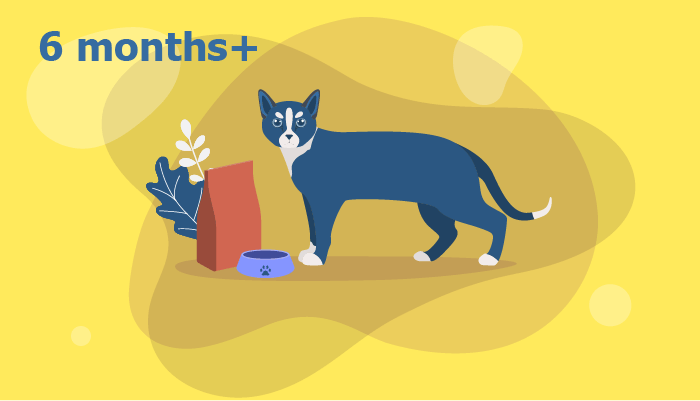
While older kittens still need plenty of calories to fuel their growth, their metabolism will start to gradually slow down and their nutritional needs will start to look more like those of an adult.
Around the time of your kitten's first birthday, he can start the transition from kitten food to an adult diet. Note, however, that larger-breed cats may continue to grow until they're 3-4 years old and may continue to eat a growth-oriented diet.
How Much Should You Feed Your Adult Cat?
As your kitten's metabolism starts to slow down and he reaches adulthood, you might notice him start to put on excess weight. Obesity is a common issue among adult cats and, when not corrected early on, may lead to complications later in life. Regular exercise and a well-controlled diet will help to prevent obesity and keep your cat in good shape.
Whether you feed your cat homemade cat food or the best commercial cat foods, it's critical to feed him the right amount per day. But there's no single amount of food that every cat should eat each day.
Calorie needs vary from cat to cat, with many factors coming into play. When deciding how much to feed your cat, you'll have to consider his breed, age, reproductive status, underlying health conditions, and more. In general, however, the recommended daily caloric intake is about 20 calories per pound of bodyweight.
Click here for a calculator that helps you identify how many calories your cat needs per day.
How Often Should You Feed Your Adult Cat?
After your cat reaches six months of age, you may feed him 2-3 meals per day.
Also Read: Best Cat Food Guide
Senior Years
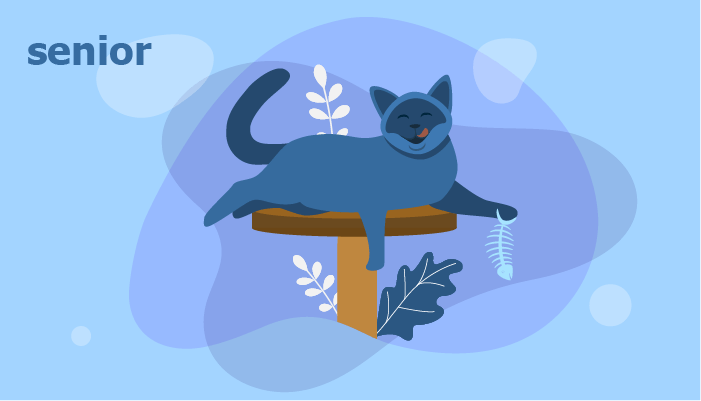
Compared to young and middle-aged adults, senior cats have unique nutritional needs. They often exhibit a reduced ability to metabolize protein and therefore tend to lose muscle mass.
They require more digestible protein to support lean muscle mass and stay healthy. Cats at this age may also develop arthritis and other inflammatory conditions, making omega-3 fatty acids a particularly beneficial addition to the senior's diet.
Since they might have difficulty eating because of dental problems, wet or moist food is better for senior cats.
How Much Should You Feed Your Senior Cat?
Senior and elderly cats require more calories per pound of bodyweight. If your senior appears to be losing muscle mass, consider increasing his calorie intake to 30-40 calories per pound. The majority of those calories should come from animal-based protein, which helps to prevent sarcopenia (loss of muscle due to aging).
How Often Should You Feed Your Senior Cat?
Continue to feed your senior cat 2-3 meals per day.
Also Read: Best Cat Food For Senior Cats
Cat Feeding Chart
| Age | Approximate Weight | Amount to Feed | Schedule |
| 0-1 week | 50-150 grams / 1.7 – 5.2 ounces | 2-6 ml kitten formula | Every 1 to 2 hours |
| 1-2 weeks | 150-250 grams / 5.2 – 8.8 ounces | 6-10 ml kitten formula | Every 1 to 2 hours |
| 2-3 weeks | 250-350- grams / 8.8 – 12.4 ounces | 10-14 ml kitten formula | Every 2 to 3 hours |
| 3-4 weeks | 350-450 grams / 12.4 – 15.9 ounces | 14-18 ml kitten formula | Every 3 to 4 hours |
| 4-5 weeks | 450-550 grams / 15.9 ounces – 1.1 pounds | Starting the weaning process, offer 18-22 ml kitten formula; gradually switch to a mixture of kitten formula / wet kitten food | Every 4 to 6 hours |
| 5-8 weeks | 550-850 grams / 1.1 – 1.5 pounds | Weaning: Offer an unlimited amount of wet kitten food | Every 6 hours |
| 8-9 weeks | 1.5 – 2.6 pounds | 250-360 calories per day | Every 6 to 8 hours |
| 9-10 weeks | 1.6 – 2.9 pounds | 250-360 calories per day | Every 6 to 8 hours |
| 10-11 weeks | 1.8 – 3.1 pounds | 250-360 calories per day | Every 6 to 8 hours |
| 11-12 weeks | 2 – 3.3 pounds | 250-360 calories per day | Every 6 to 8 hours |
| 12-13 weeks | 2.2 – 4 pounds | 250-360 calories per day | Every 6 to 8 hours |
| 13-14 weeks | 3 – 4.5 pounds | 250-360 calories per day | Every 6 to 8 hours |
| 14-15 weeks | 3.5 – 5 pounds | 250-360 calories per day | Every 6 to 8 hours |
| 15-16 weeks | 4 – 5.5 pounds | 250-360 calories per day | Every 6 to 8 hours |
| 4 months | 4 – 5.5 pounds | 60-65 calories per pound of bodyweight per day | Every 8 hours |
| 5 months | 5.1 – 6 pounds | 60-65 calories per pound of bodyweight per day | Every 8 hours |
| 6 months | 5.5 – 6.5 pounds | 60-65 calories per pound of bodyweight per day | Every 8 – 12 hours |
| 7 months | 6 – 7 pounds | 60-65 calories per pound of bodyweight per day | Every 8 – 12 hours |
| 8 months | 6.5 – 7.5 pounds | 60-65 calories per pound of bodyweight per day | Every 8 – 12 hours |
| 9 months | 7 – 8 pounds | 60-65 calories per pound of bodyweight per day | Every 8 – 12 hours |
| 10 months | 7.5 – 8.5 pounds | 60-65 calories per pound of bodyweight per day | Every 8 – 12 hours |
| 11 months | 8 – 9 pounds | 60-65 calories per pound of bodyweight per day | Every 8 – 12 hours |
| 12 months | 8 – 9.5 pounds | 60-65 calories per pound of bodyweight per day | Every 8 – 12 hours |
Final Thoughts
Your Cat Needs Water, Too!
In addition to the correct food regimen, it's also important that a cat has access to clean water. Proper hydration helps to prevent constipation and reduces the risk of urinary system diseases like urinary tract infection and blockage.
Access to fresh water is essential, regardless of if your feline friend eats dry or wet food.
Finally, Consider Consulting Your Veterinarian For More Advice.
Even with the knowledge shared in this article, you should consult with your veterinarian for your cat's individual dietary needs. Your veterinarian will be able to recommend the ideal diet and feeding regimen for your cat based on your cat's age, lifestyle, dietary preferences, and overall health status.
Source: https://allaboutcats.com/cat-feeding-guide